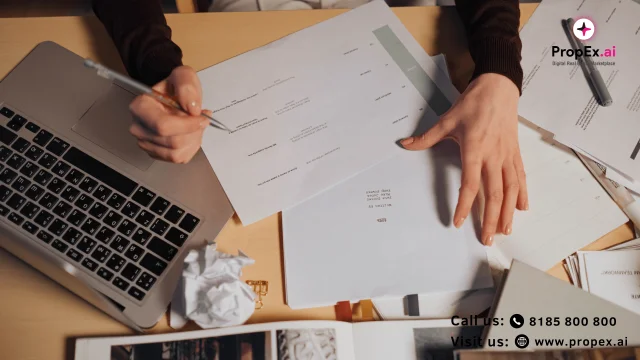Introduction
Buying a house is a dream come true for most of us. There’s a lot of struggle that goes into reaching the phase of home ownership. But before you make the investment and want to buy the place you always dreamed of, there are certain documents that you need to be on top of.
So, you’ve decided to take the plunge and buy your dream property. Exciting, isn’t it? But before you start envisioning your future home, there’s one crucial thing you need to prepare for – the paperwork. Don’t worry; we’re here to guide you through it all in a friendly, and conversational manner.
So what are all the documents that you require while buying a house? How do you obtain these documents? These queries must be cleared for you to have a seamless experience while purchasing the house of your dreams. So, to stay informed about this extremely important subject, let us take a deep dive into all the nuances of it in this blog.
Looking to Buy a Property? Get Ready for the Paperwork!
Sale Deed: The Key to Ownership
First things first – the Sale Deed. This is the big one. Your golden ticket to property ownership. The Sale Deed establishes your rightful claim to the property. Remember, it must be in its original form, and you’ll need to register it at the Sub-Registrar’s Office in the property’s location. Ensure this as this is the most important prospect of any property!
Extracts: Your Property’s Vital Records
Next up, is the Khata certificate or extract? Its name might change depending on your state, but its importance doesn’t. This document proves that your property is duly registered in the local municipal records and that the construction complies with approved plans. It’s better to buy a property using a loan as you do not want to invest most of your savings in one financial transaction. You’ll need this if you’re eyeing that sweet home loan from the bank.
Mutation Register Extract: For Gram Panchayat Properties
If your property falls under Gram Panchayat jurisdiction, you’ll require the Mutation Register Extract. This document details the property’s previous ownership history. While not necessary in its original form, it’s a must-have if you’re buying in a Gram Panchayat area. Learn about your property. Know under which jurisdiction it falls under. If you notice that it’s a Gram Panchayat property, this document will serve you as the most crucial enabler of authenticity.
General Power Of Attorney: The Authoritative Proof
To ensure that the property transaction is legitimate, the General Power Of Attorney comes into play. It proves that the sale or purchase is authorized on behalf of the property owner. Be sure to have the original copy on hand when applying for a home loan. Even if the rightful owner of the property is not in the country, he can authorize the transaction by enabling a power of attorney.
Copy Of Building Plan: Ensuring Legality
Don’t forget to get a copy of the building plan approved by the statutory body. This document is required to ensure that the property construction adheres to local rules and regulations – a must for any diligent buyer. You must give some thought to this and better yet, get it inspected by any engineer who is approved by the local municipality.
No-Objection Certificates (NOC)
Developers usually need up to 19 NOCs from different authorities for housing projects (though the number can vary by state). Ask your developer for copies of these NOCs, and keep them in your records. They’re your assurance of a smooth property purchase. They will make your documentation stronger and allow you to take care of any legal discrepancies, if any, that may come your way.
Allotment Letter
An Allotment Letter is a crucial document, especially if you want that home loan to buy out your dream property at the right time and price. It describes the property and the amount you’ve paid to the developer. Remember, it’s not the same as a Sale Agreement, and other owners can request a copy as well. This will act as your key to receiving the home loan from your bank.
Sale Agreement: The Property Blueprint
The Sale Agreement is where all the property details come together – terms, possession date, payment plan, specifications, common areas, and more. This must be presented in its original form for property purchase and for securing that home loan. This document shall be carefully evaluated by the bank’s personnel such as the property valuator. He will assess the authenticity and use these details to release the funds from the bank.
Possession Letter: The Key to Your New Home
The Possession Letter, provided by the developer, sets the date when you’ll get the keys to your new home. Ensure you have the original copy for your home loan application.
Payment Receipts: Proof of Investment
For new properties, collect original payment receipts from the developer. If it’s a resale property, ask the seller for copies to submit to the bank.
Property Tax Receipts: Keeping It Legal
Property owners have tax obligations. Check that the previous owner paid all property taxes and there are no outstanding dues. Property tax receipts also confirm the property’s legal status.
Encumbrance Certificate: Clearing Legal Hurdles
This certificate is crucial to prove there are no pending legal dues or mortgages on the property. Banks often require this before granting loans. It provides a record of all property transactions over time.
Also read: What is EC in Property
Completion Certificate: The Green Light!
This certificate confirms that the building complies with approved plans, making it a prerequisite for securing a home loan. It also portrays that the building has been constructed safely abiding by all the regulations of the local land.
Occupancy Certificate: Ready to Move In
Lastly, the Occupancy Certificate signifies that the building is fit for occupancy and constructed according to sanctioned plans. This also means that this is the last step for you to move into your brand-new home!
Now that you’re aware of all this knowledge, the paperwork won’t seem so daunting, right? Happy house hunting!





